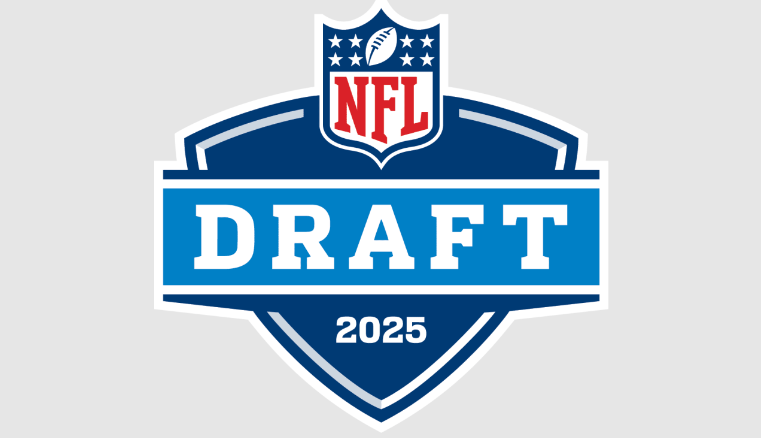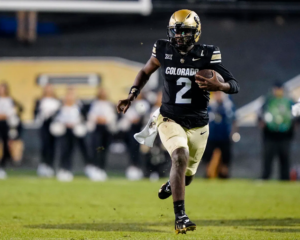
Colin Cowherd Endangers His Credibility After Declaring Shedeur Sanders as No. 1 Draft Pick
Colin Cowherd has stirred the pot in the sports commentary world with his recent declaration that Shedeur Sanders, the standout quarterback for the Colorado Buffs, should be considered the No. 1 pick in the upcoming NFL draft. This announcement has sparked a significant amount of debate, particularly regarding Cowherd’s credibility as an analyst. His remarks not only reflect a sudden shift in opinion but also raise questions about the consistency and rationale behind his evaluations of various quarterbacks.
Shedeur Sanders has emerged as a remarkable talent in college football, earning accolades and increasing attention as a potential top draft pick. Following a string of impressive performances, many analysts have begun to highlight his abilities, positioning him as a leading candidate for the 2025 NFL draft. Notably, ESPN analyst Mel Kiper Jr. recently stated that he was ready to declare Sanders as the top quarterback for the upcoming draft. Cowherd’s sudden alignment with this perspective feels abrupt, especially given his previous critiques of Sanders’ performance.
In a recent episode of “Herd with Colin Cowherd,” Cowherd engaged in a discussion with Fox Sports analyst Joel Klatt, where he asserted that it was “pretty obvious” that Sanders should be the No. 1 pick. However, his rationale raised eyebrows. Cowherd claimed that Miami Hurricanes quarterback Cam Ward “feels small,” implying that this physical characteristic disqualified him from being the top choice. This commentary became controversial, especially since he compared Ward to Sanders, who is of similar stature but received no such critique from Cowherd.
Klatt quickly countered Cowherd’s assertion, highlighting the inconsistency in calling out Ward’s height while giving Sanders a pass. “I just don’t think he’s separated like what you’re suggesting,” Klatt remarked, pointing to the inconsistency in Cowherd’s evaluations. This back-and-forth exemplifies the confusion and contradictions that Cowherd has increasingly become associated with. His indecisiveness on such a public platform raises serious questions about his credibility as a sports analyst.
This inconsistency is not a new phenomenon for Cowherd. Following Colorado’s loss to Nebraska, he was notably critical of Sanders, suggesting that the media narrative surrounding him felt more like a promotional campaign than an authentic assessment of his skills. Cowherd described the push for Sanders as akin to a “timeshare sales pitch,” expressing his frustration with the narrative being built around the quarterback. This kind of commentary not only undermines his later assertions but also showcases a troubling hypocrisy. How can Cowherd advocate for Sanders as the top pick one moment and then dismiss him as a mere product of media hype the next?
Fans have taken notice of Cowherd’s contradictory statements and have not been shy about voicing their concerns. Social media platforms, particularly X, have become arenas for critique, with many users pointing out that just weeks ago, Cowherd was dismissive of Sanders’ abilities. One user noted, “I swear it wasn’t even a month ago Colin said he was out on Shedeur; now he has him as the #1 pick.” This highlights the rapid and often confusing shifts in Cowherd’s opinions, leading many to question his credibility as an evaluator of talent.
Further compounding the issue is Cowherd’s recent commentary on other quarterbacks, particularly Bo Nix and Brock Purdy. A user criticized Cowherd for declaring Nix as “better than Brock,” suggesting that such rankings demonstrate a lack of consistent criteria when evaluating quarterbacks. The rapid-fire nature of Cowherd’s evaluations creates an impression that he may be more interested in sensationalism than in providing well-reasoned analysis.
The critiques of Cowherd have become increasingly pointed, with some fans drawing political comparisons to underscore their frustrations. One user went so far as to liken Cowherd’s inconsistency to that of Vice President Kamala Harris, a comparison that speaks volumes about the level of scrutiny Cowherd is facing. Such comments indicate a growing perception that his credibility is in jeopardy, as fans demand a level of consistency that they feel has been lacking.
Cowherd’s remarks about Cam Ward have added another layer of complexity to the situation. By calling Ward “too small” while simultaneously championing Sanders, Cowherd has raised questions about his criteria for evaluating quarterbacks. If both players share similar physical attributes, why the discrepancy in treatment? This inconsistency further undermines Cowherd’s credibility, as fans and analysts alike begin to wonder if he is applying a double standard.
The fallout from Cowherd’s recent statements reflects a broader issue in sports analysis. Fans today have access to a plethora of voices and opinions, making it easier to identify contradictions and inconsistencies. In an age where social media amplifies every statement, analysts must navigate the fine line between providing fresh takes and maintaining credibility. Cowherd’s approach seems to blur this line, leaving many questioning whether he is a reliable source for insight on player evaluations.
As the 2025 NFL draft approaches, the scrutiny surrounding Cowherd’s commentary will likely intensify. Analysts and fans alike will be watching closely to see if he maintains his current stance on Sanders or if he shifts again as the narratives around other quarterbacks evolve. The sports media landscape is highly dynamic, and Cowherd’s ability to adapt while retaining credibility will be critical in the coming months.
In the world of sports commentary, credibility is everything. For Colin Cowherd, the pressure to provide insightful, consistent analysis is paramount, especially as the stakes rise with the NFL draft on the horizon. His recent declarations about Shedeur Sanders and other quarterbacks serve as a reminder that inconsistency can quickly erode credibility, leading fans to question the validity of an analyst’s insights.
As discussions around Shedeur Sanders and his potential as the No. 1 draft pick continue to gain momentum, Cowherd’s evolving narrative highlights the importance of maintaining a coherent and reasoned perspective. In an environment where opinions can shift rapidly, analysts must be diligent in providing evaluations that are both informed and consistent. Whether Cowherd can reclaim his credibility remains to be seen, but the scrutiny he faces is a testament to the high expectations placed on sports analysts in today’s media landscape. The conversation surrounding Sanders is just beginning, and how Cowherd navigates this narrative will likely define his reputation moving forward.
Ultimately, sports analysis thrives on nuanced perspectives and informed assessments. Analysts like Colin Cowherd play a crucial role in shaping public discourse around players and teams, but they must do so with a commitment to consistency and clarity. As the debate around Shedeur Sanders unfolds, it serves as a crucial reminder of the delicate balance that must be maintained in sports commentary.


Leave a Reply